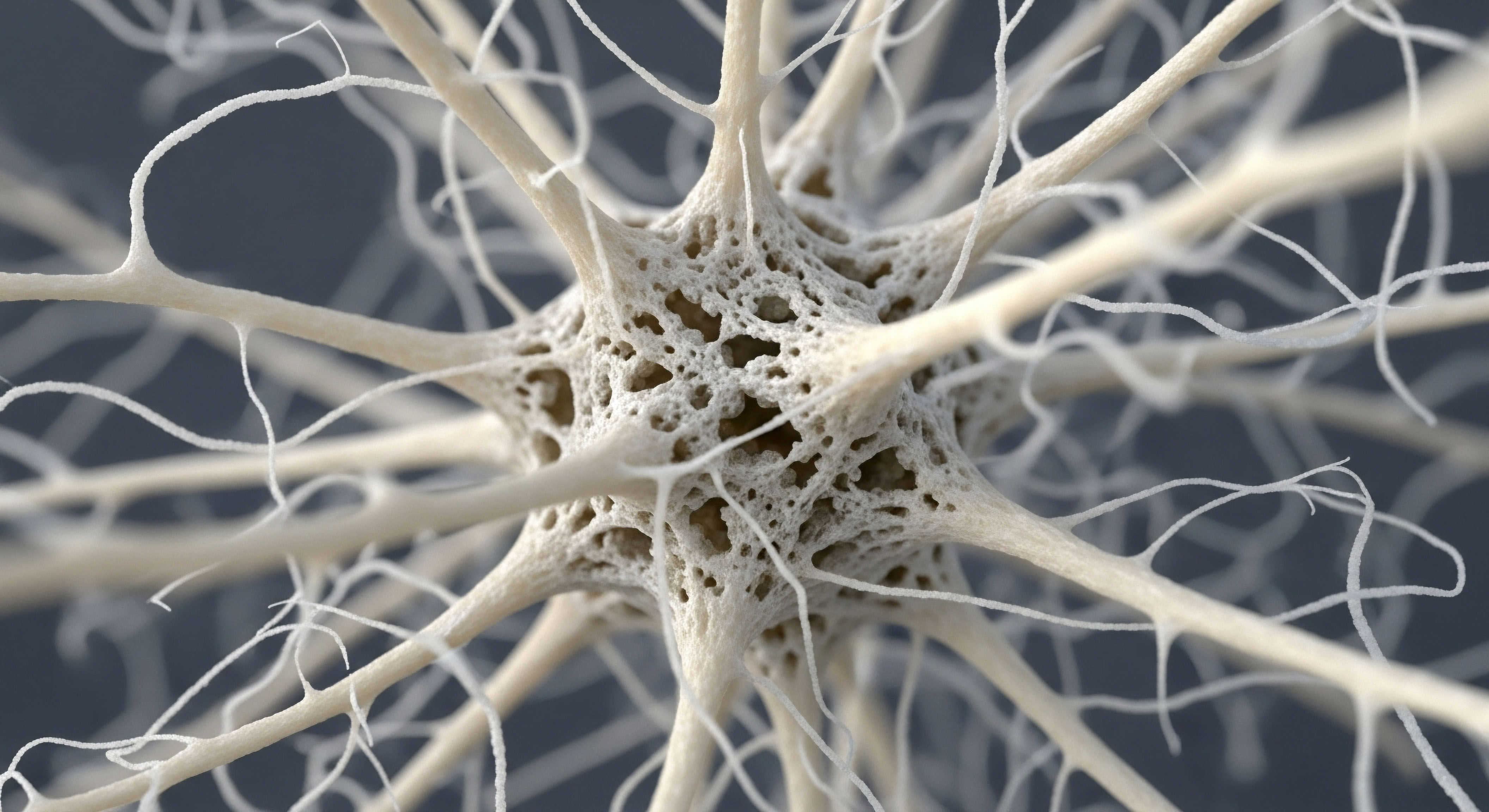

Fundamentals
Do you ever experience moments where your thoughts feel clouded, your memory seems less sharp, or your emotional responses feel out of sync? Many individuals report a subtle yet persistent sense of cognitive drift, a feeling that their mental clarity has diminished over time.
This experience often accompanies shifts in energy levels, sleep patterns, or even changes in physical composition. These subtle alterations in daily experience frequently signal deeper biological adjustments occurring within the body, particularly within the intricate messaging system of hormones.
Your body operates through a sophisticated network of chemical messengers known as hormones. These substances, produced by various glands, travel through the bloodstream to distant organs and tissues, orchestrating a vast array of physiological processes. Consider them as the body’s internal communication system, sending precise instructions that regulate everything from metabolism and mood to growth and reproduction. When this communication system experiences interference or imbalance, the effects can ripple throughout your entire being, including your cognitive and emotional landscape.
The brain, a highly metabolically active organ, relies heavily on consistent and appropriate hormonal signaling for optimal function. Hormones influence neurotransmitter production, neuronal growth, synaptic plasticity, and even cerebral blood flow. A disruption in this delicate balance can manifest as the very symptoms you might be experiencing ∞ difficulty concentrating, irritability, reduced mental stamina, or a general sense of mental fogginess. Recognizing these connections marks the initial step toward understanding your unique biological systems.
Hormones act as the body’s essential messengers, profoundly influencing brain function and overall well-being.

Hormones and Brain Communication
The endocrine system, a collection of glands that produce and secrete hormones, maintains a constant dialogue with the central nervous system. This continuous interaction is essential for maintaining physiological equilibrium. For instance, the hypothalamic-pituitary-gonadal (HPG) axis represents a prime example of this intricate communication.
The hypothalamus, located in the brain, sends signals to the pituitary gland, which then directs the gonads (testes in men, ovaries in women) to produce sex steroids such as testosterone and estrogen. These sex steroids, in turn, exert significant effects on brain regions involved in mood, cognition, and memory.
When considering interventions to support hormonal health, it becomes apparent that these actions are not merely about addressing a single symptom. Instead, they represent an effort to recalibrate a complex biological system. The goal is to restore a state of internal balance, allowing the body’s inherent intelligence to function with greater efficiency. This approach moves beyond simple symptom management, aiming for a more fundamental restoration of vitality and function.

The Endocrine System’s Influence on Cognition
Every hormone, whether it is a sex steroid, a thyroid hormone, or a stress hormone, plays a part in shaping brain activity. Thyroid hormones, for instance, are critical for neuronal development and metabolic rate within brain cells. Cortisol, a stress hormone, can influence memory consolidation and emotional regulation.
Sustained imbalances in any of these hormonal messengers can lead to observable changes in cognitive performance and emotional stability. Understanding these foundational relationships provides a framework for evaluating the potential impacts of any hormonal intervention.
Many individuals seek support for symptoms that they intuitively link to hormonal shifts, even before clinical confirmation. This personal experience is a valid starting point for investigation. The scientific community has increasingly recognized the profound influence of endocrine balance on neurological health, moving beyond isolated observations to a more integrated understanding of the body’s systems. This integrated view forms the basis for exploring targeted wellness protocols.


Intermediate
Once a foundational understanding of hormonal influence on the brain is established, the discussion naturally progresses to specific strategies for biochemical recalibration. Hormonal optimization protocols are designed to address deficiencies or imbalances that contribute to a decline in well-being, including cognitive function. These protocols involve the careful administration of specific agents, aiming to restore physiological levels of hormones that may have diminished due to aging, stress, or other factors.
Consider the analogy of a sophisticated internal thermostat system. When the temperature drops below an optimal range, the heating system activates to bring it back into balance. Similarly, when certain hormone levels fall below their ideal set points, targeted interventions can help restore them, allowing the body’s systems, including the brain, to operate more effectively. This section explores some common protocols and their direct relevance to supporting neurological health.

Testosterone Replacement Therapy for Men
For men experiencing symptoms of low testosterone, often termed andropause, Testosterone Replacement Therapy (TRT) is a common protocol. Symptoms such as reduced mental acuity, diminished motivation, and altered mood are frequently reported alongside physical changes. TRT aims to restore testosterone levels to a healthy physiological range, which can positively influence cognitive aspects.
A standard protocol often involves weekly intramuscular injections of Testosterone Cypionate (200mg/ml). This form of testosterone provides a steady release, helping to maintain stable levels. To support natural testosterone production and preserve fertility, Gonadorelin is frequently included, administered as subcutaneous injections twice weekly. Gonadorelin stimulates the pituitary gland to release luteinizing hormone (LH) and follicle-stimulating hormone (FSH), which are essential for testicular function.
Estrogen conversion from testosterone can occur, and elevated estrogen levels in men can lead to undesirable effects, including potential cognitive concerns. To mitigate this, an aromatase inhibitor like Anastrozole is often prescribed, typically as an oral tablet twice weekly. This medication helps to block the conversion of testosterone into estrogen, maintaining a healthier balance. In some cases, Enclomiphene may be added to further support LH and FSH levels, particularly when fertility preservation is a primary concern.
Testosterone optimization in men aims to restore physiological levels, potentially improving cognitive function and overall vitality.

Testosterone Replacement Therapy for Women
Women, too, can experience symptoms related to suboptimal testosterone levels, particularly during peri-menopause and post-menopause. These symptoms can include irregular cycles, mood fluctuations, hot flashes, and a decline in libido, often accompanied by changes in mental clarity. Protocols for women are carefully tailored to their unique physiological needs.
A typical approach involves low-dose Testosterone Cypionate, usually 10 ∞ 20 units (0.1 ∞ 0.2ml) weekly via subcutaneous injection. This precise dosing helps to avoid supraphysiological levels while still providing therapeutic benefits. Progesterone is often prescribed alongside testosterone, with its use determined by the woman’s menopausal status and individual hormonal profile. Progesterone plays a significant role in mood regulation and sleep quality, both of which influence brain health.
Another option for women is Pellet Therapy, which involves the subcutaneous insertion of long-acting testosterone pellets. This method provides a consistent release of the hormone over several months. When appropriate, Anastrozole may also be used in women to manage estrogen levels, particularly if there is a tendency towards excessive conversion or if specific symptoms warrant it.

Growth Hormone Peptide Therapy
Peptide therapies represent another avenue for biochemical recalibration, often sought by active adults and athletes. These agents work by stimulating the body’s own production of growth hormone, rather than directly administering it. This approach aims to support anti-aging processes, muscle gain, fat loss, and improvements in sleep quality, all of which indirectly benefit brain health.
Key peptides in this category include Sermorelin, Ipamorelin / CJC-1295, Tesamorelin, and Hexarelin. These peptides act on the pituitary gland to encourage the pulsatile release of growth hormone. MK-677, an oral growth hormone secretagogue, also stimulates growth hormone release. The benefits of optimized growth hormone levels extend to cellular repair and regeneration, which are vital for maintaining neurological integrity.
| Intervention Type | Primary Target Audience | Key Hormones/Peptides | General Health Aim |
|---|---|---|---|
| Testosterone Replacement Therapy (Men) | Middle-aged to older men | Testosterone Cypionate, Gonadorelin, Anastrozole | Restore vitality, muscle mass, cognitive function |
| Testosterone Replacement Therapy (Women) | Peri/Post-menopausal women | Testosterone Cypionate, Progesterone, Pellets | Balance hormones, improve mood, libido, cognition |
| Growth Hormone Peptide Therapy | Active adults, athletes | Sermorelin, Ipamorelin, Tesamorelin, MK-677 | Anti-aging, body composition, sleep quality |
| Post-TRT/Fertility Protocol (Men) | Men discontinuing TRT or seeking fertility | Gonadorelin, Tamoxifen, Clomid | Restore natural hormone production, fertility |

Other Targeted Peptides
Beyond growth hormone secretagogues, other peptides address specific aspects of health that can indirectly influence brain function. PT-141, for instance, is used for sexual health, addressing concerns that can significantly impact mental well-being and relationship satisfaction. Its action on melanocortin receptors in the brain can influence sexual desire.
Pentadeca Arginate (PDA) is another peptide with applications in tissue repair, healing, and inflammation reduction. Chronic inflammation is increasingly recognized as a contributor to cognitive decline and various neurological conditions. By supporting the body’s healing processes and modulating inflammatory responses, PDA can contribute to an environment more conducive to optimal brain health.
- Testosterone Cypionate ∞ A synthetic form of testosterone used in both men and women to address low levels.
- Gonadorelin ∞ A peptide that stimulates the release of LH and FSH, supporting natural hormone production.
- Anastrozole ∞ An aromatase inhibitor that reduces the conversion of testosterone to estrogen.
- Progesterone ∞ A steroid hormone important for female reproductive health and neurological function.
- Sermorelin ∞ A growth hormone-releasing peptide that stimulates the pituitary gland.


Academic
The consideration of hormonal interventions for brain health necessitates a rigorous examination of potential risks. While the aim of these protocols is to restore physiological balance and enhance well-being, any manipulation of the endocrine system carries the potential for unintended consequences, particularly within the highly sensitive neuroendocrine environment. Understanding these specific risks requires a deep dive into the molecular and cellular mechanisms by which hormones interact with brain tissue.
The brain is not merely a passive recipient of hormonal signals; it actively participates in their regulation and responds dynamically to their concentrations. Alterations in hormone levels, whether too low or supraphysiological, can disrupt delicate feedback loops and influence neurotransmitter systems, neuronal excitability, and cellular metabolism. This section will explore the specific risks associated with hormonal interventions, focusing on the intricate interplay between the endocrine system and neurological function.

How Do Hormonal Imbalances Affect Neuronal Excitability?
One significant area of concern involves the direct effects of sex steroids on neuronal excitability. Estrogens, for example, are known to modulate the activity of various neurotransmitter systems, including GABAergic (gamma-aminobutyric acid) and glutamatergic pathways. While estrogens generally exhibit neuroprotective properties at physiological levels, particularly in supporting synaptic plasticity and neuronal survival, supraphysiological concentrations can lead to adverse effects.
High estrogen levels, whether endogenous or exogenously administered, may alter the balance between excitatory and inhibitory neurotransmission, potentially contributing to neuronal hyperexcitability or, conversely, a state of neuronal quiescence that impairs cognitive processing.
Androgens, such as testosterone, also exert direct effects on neuronal function. Testosterone can influence dendritic arborization and synaptic density in certain brain regions. The conversion of testosterone to dihydrotestosterone (DHT) or estradiol within brain tissue adds another layer of complexity. An imbalance in these conversions, perhaps due to aromatase inhibitor use or excessive testosterone administration, could lead to localized deficiencies or excesses of specific neuroactive steroids, thereby impacting cognitive performance or mood regulation.
Hormonal interventions, while beneficial, require careful consideration of their potential to disrupt delicate neuroendocrine balance.

What Are the Cognitive Risks of Supraphysiological Hormone Levels?
Administering hormones at levels exceeding physiological norms, even inadvertently, poses distinct risks to brain health. Supraphysiological testosterone levels, for instance, can lead to an increase in red blood cell count (erythrocytosis), which elevates blood viscosity. This increased viscosity can impair cerebral blood flow, potentially reducing oxygen and nutrient delivery to brain tissue. While acute effects might be subtle, chronic cerebral hypoperfusion can contribute to cognitive decline over time.
Furthermore, excessive testosterone can lead to increased aromatization into estrogen. While some estrogen is neuroprotective, excessively high estrogen levels in men can be associated with cognitive impairment, including issues with verbal memory and executive function. The brain’s estrogen receptors, both alpha and beta, respond differently to varying concentrations, and an overstimulation can lead to receptor desensitization or even neuroinflammatory responses.
Growth hormone peptide therapies, while generally considered safer than direct growth hormone administration, also warrant careful monitoring. While optimal growth hormone and IGF-1 levels support neuronal health and plasticity, chronically elevated levels could theoretically lead to receptor downregulation or altered metabolic signaling within the brain. The long-term implications of sustained, elevated growth hormone secretagogue use on brain aging and neurodegenerative risk require ongoing research and careful clinical observation.

How Do Hormonal Interventions Affect Neurotransmitter Systems?
The intricate relationship between hormones and neurotransmitters is a critical aspect of brain health. Hormones can directly influence the synthesis, release, reuptake, and receptor sensitivity of key neurotransmitters like dopamine, serotonin, and norepinephrine. For example, testosterone influences dopaminergic pathways, which are central to motivation, reward, and executive function. Alterations in testosterone levels, particularly rapid fluctuations or supraphysiological concentrations, can dysregulate these pathways, potentially contributing to mood instability, irritability, or reduced cognitive drive.
Similarly, progesterone and its neuroactive metabolites, such as allopregnanolone, are potent modulators of GABA-A receptors, which mediate inhibitory neurotransmission. While physiological levels of progesterone contribute to calming effects and improved sleep, rapid withdrawal or unphysiological dosing can disrupt this balance, potentially leading to anxiety, agitation, or sleep disturbances that indirectly impair cognitive function. The precise dosing and titration of progesterone, particularly in women, are therefore paramount to avoid adverse neurological effects.
| Intervention Type | Specific Risk Area | Mechanism of Action | Potential Cognitive Impact |
|---|---|---|---|
| Testosterone Replacement Therapy (Men) | Supraphysiological levels | Increased blood viscosity, excessive estrogen conversion | Impaired cerebral blood flow, verbal memory issues |
| Testosterone Replacement Therapy (Women) | Unbalanced dosing | Altered neurosteroid ratios, receptor desensitization | Mood instability, anxiety, sleep disturbances |
| Aromatase Inhibitor Use | Excessive estrogen suppression | Reduced neuroprotective estrogen in brain | Cognitive decline, mood dysregulation |
| Growth Hormone Peptide Therapy | Chronic overstimulation | Potential receptor downregulation, metabolic shifts | Long-term neurodegenerative risk (theoretical) |

What Are the Long-Term Implications of HPG Axis Suppression?
Many exogenous hormonal interventions, particularly testosterone replacement therapy, can suppress the body’s endogenous hormone production through negative feedback on the hypothalamic-pituitary-gonadal (HPG) axis. This suppression means the brain reduces its signals (GnRH, LH, FSH) to the gonads, leading to a reduction in natural hormone synthesis. While this is an expected pharmacological effect, the long-term implications of chronic HPG axis suppression on overall neuroendocrine health warrant consideration.
The HPG axis is not solely responsible for sex steroid production; it also plays a role in maintaining the delicate balance of other neurohormones and neuropeptides that influence mood, stress response, and cognitive resilience.
Protocols designed to mitigate this suppression, such as the inclusion of Gonadorelin or selective estrogen receptor modulators (SERMs) like Tamoxifen or Clomid in post-TRT protocols, aim to restore the integrity of this axis. The objective is to prevent a state of prolonged dependence on exogenous hormones and to support the body’s innate capacity for hormonal regulation.
The decision to pursue hormonal interventions requires a thorough understanding of these complex interactions. A careful assessment of individual health status, a precise diagnostic approach, and ongoing clinical monitoring are essential to mitigate potential risks and ensure that the benefits of therapy outweigh any adverse effects. The aim is always to achieve a state of optimal physiological function, supporting not only physical vitality but also the clarity and resilience of the mind.

References
- McEwen, Bruce S. “Estrogens and the Brain ∞ Beyond Reproductive Functions.” Annual Review of Neuroscience, vol. 34, 2011, pp. 227-247.
- Viau, Victor, and Michael J. Meaney. “The Neuroendocrinology of Stress and Adaptation.” Handbook of Neuroendocrinology, edited by George Fink, Donald W. Pfaff, and Jon E. Levine, Academic Press, 2012, pp. 115-144.
- Snyder, Peter J. et al. “Effects of Testosterone Treatment on Cognitive Function in Older Men with Low Testosterone Levels ∞ A Randomized Controlled Trial.” JAMA, vol. 317, no. 7, 2017, pp. 717-727.
- Genazzani, Alessandro D. et al. “Neuroactive Steroids and Cognitive Function.” Journal of Steroid Biochemistry and Molecular Biology, vol. 146, 2015, pp. 1-8.
- Ho, Ken K. Y. et al. “Growth Hormone and the Brain ∞ A Review of Cognitive and Mood Effects.” Clinical Endocrinology, vol. 71, no. 3, 2009, pp. 311-318.
- Remage-Healey, L. “Rapid Neurosteroid Actions in the Brain ∞ From Synaptic Plasticity to Behavior.” Frontiers in Neuroendocrinology, vol. 35, no. 2, 2014, pp. 165-179.
- Brinton, Roberta Diaz. “Neurosteroids as Modulators of Brain Function.” Nature Reviews Neuroscience, vol. 13, no. 10, 2012, pp. 711-721.
- Bhasin, Shalender, et al. “Testosterone Therapy in Men with Androgen Deficiency Syndromes ∞ An Endocrine Society Clinical Practice Guideline.” Journal of Clinical Endocrinology & Metabolism, vol. 95, no. 6, 2010, pp. 2536-2559.
- Handelsman, David J. and Ronald S. Swerdloff. “Pharmacology of Testosterone Replacement Therapy.” Testosterone ∞ Action, Deficiency, Substitution, edited by Eberhard Nieschlag and Hermann M. Behre, Cambridge University Press, 2012, pp. 325-360.

Reflection
Understanding your body’s intricate hormonal systems marks a significant step toward reclaiming your vitality. The information presented here serves as a guide, offering insights into the complex interplay between hormones and brain health. This knowledge empowers you to engage in more informed conversations about your well-being.
Your personal health journey is unique, shaped by individual biology, lifestyle, and experiences. The path to optimal function often requires a personalized approach, guided by careful assessment and ongoing support. Consider this exploration a starting point, a foundation upon which to build a deeper understanding of your own biological systems. The pursuit of vitality is a continuous process, one that benefits immensely from a proactive and informed perspective.



